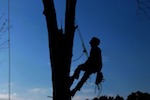When obsession has me in its grip

I jog and listen to a book at the same time thanks to my headphones. I take a plane and learn how to use new tools thanks to my Kindle. I spend my time slotting my professional, family and personal activities into one another like a giant game of Tetris so that I’m always doing more things more quickly and all at the same time.
In other words, I’m often phenomenally efficient, and obsession tends to generate more obsession.
But what happens when the noise stops?
During my 6-week hike this summer, all I did was put one foot in front of the other. No headphones. Silence around me. Silence inside.
Picnicking alone. A sea view. No books. No conversations. Even a tin of tuna tastes different under such circumstances.
Having got a taste for doing just one activity (as well as for tuna), I now feel that I’d like to be more present in my everyday activities.
What about you? What single activity would you like to spend your time doing without being drowned out by your own obsessiveness?
Having a sort-out
We all know someone who drives us to despair. This person has an amazing talent for systematically pointing out the one thing that’s not right.
You proudly show this person your new car and he or she will point out that the boot is too small for your shopping or too big to be able to park easily.
You tell them that you’ve bought a holiday flat by the sea and they’re sure to say that from now on you’ll always have to go there and you’ll never get the chance to go anywhere else.
Their talent is to find the 10% that’s not right, according to their standards.
The saviour side of me used to want to turn such people into optimists. But years of experience has taught me that the thing to do is to have a sort-out of my friendships. Instead of wanting to save these poor unfortunates, I’ve simply stopped seeing them. It does wonders for my nerves and my time management.
What about you? Who do you allow to spoil your enjoyment of buying things and making decisions? Do you need to have a sort-out?
A tree

Jutta is the person with the strongest roots that I have ever had the pleasure of meeting.
She is the very image of a tree rooted in the earth, because she has never left the town where she was born, she speaks the same dialect no matter which language she is using and she single-handedly represents a region and a local way of life.
So far, there’s nothing really remarkable about this story – until this country girl puts on her rucksack, walks across India or finds an excuse to chat with any strangers that she comes across in an unknown country.
She has an open-mindedness lacking in many city dwellers who consider themselves cosmopolitan. I’ve certainly learnt a lesson of humility from her. She has always said that she admires my life as a multilingual businesswoman and serial homing pigeon. And yet,
staying with the tree analogy, it is Jutta who has branches that extend in all directions touching on philosophy, religions, open-mindedness, complete lack of judgement, and is an example to many of us.
She successfully combines the deepest roots with the longest branches. But she still lives in the place where I was also born.
Who is the “tree” with branches longer than yours that you admire in the place where you were born? Tell them. They will be pleased to hear it, and leaning against their trunk will do you the world of good. I know from experience.
Making the link

Roman, 24, walks with me one day while I’m hiking. We chat away and I find out that he likes climbing.
It turns out that it’s even become his job, something that can’t have been easy to achieve. Especially when you consider that he trained as a gardener. Three questions later, I find out that he’s a tree surgeon working at a significant height off the ground. He climbs up using a rope and self-belay techniques, prunes branches at arm’s length with a chainsaw, treats the wounds and climbs down. And he loves it.
The connection between gardening and climbing is not that easy to see, but it seems obvious once you know.
A bit later the same day, I’m walking with Valentin who has just quit his job in insurance to do something more creative. He loves art. Guess what he’s going to do? Offer his services to museums to renegotiate their insurance contracts!
I’m amazed by so much creativity!
What about you? How could you combine your passion with what you do for a living?
An arm

Kelly tells us that when she was finding it difficult to get about at the end of her pregnancy, her husband confronted her about her lack of activity, asking: “So what have you done all day?” Without batting an eyelid, she instantly replied, “I’ve grown an arm – what about you?”
I’d love to be able to come up with a smart reply like that.
Technically, she hadn’t actually grown an arm on that particular day, but she did explain to her husband that even though it looked like she was doing nothing, things had progressed below the surface.
This example could apply to most people’s daily lives. We don’t suddenly bring new, fantastic projects, ideas and babies into the world. We think, develop, nurture and refine most things over a certain period of time before telling other people about them.
What kind of arm are you currently growing below the surface? And what would you like to say to people who confront you about the time it takes for something to progress?